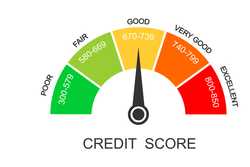How to Get an Apartment With Bad Credit

Our evaluations and opinions are not influenced by our advertising relationships, but we may earn a commission from our partners’ links. This content is created by TIME Stamped, under TIME’s direction and produced in accordance with TIME’s editorial guidelines and overseen by TIME’s editorial staff. Learn more about it.
It’s a tough situation to find yourself in. You need a place to live, but your credit report isn't exactly filled with the kind of information a landlord wants to see. And your credit score? It's languishing at the bottom of the scale. But before you panic or think of giving up, know that there are things you can do to secure a lease even if you have bad credit. Here's what you need to do and know.
It's natural to be nervous when apartment hunting with bad credit. Here are some steps you can take to increase your chances of success.
Not all landlords pull credit or require good credit reports and scores. Those who don't typically are landlords with only one unit or who cater to a neighborhood where people tend to have credit challenges.
One of the easiest ways to get an apartment when you have bad credit is to partner with someone who has good credit. Try to find a roommate who can be the primary leaseholder. Or ask someone you trust and who trusts you to cosign or be a guarantor. That person will provide reassurance to the landlord that rent will be paid.
If you’ve rented apartments in the past without any problems, ask your former landlords for letters of recommendation. A letter from your employer extolling your virtues can also go a long way. Make sure these letters include full names and contact information so the landlord can get in touch with them to verify the information.
Remember, landlords mainly want to know that you will be financially responsible. If your credit report is giving them pause, offer to pay a little more for the security deposit or—if you have the funds—to pre-pay some months’ rent.
Most businesses, including landlords, use the FICO Score to quickly and objectively determine your credit risk. These credit scores range from 300 to 850, with higher figures being preferable because they indicate lower credit risk. If you have a low credit score, you are perceived as being financially risky.
A FICO Score that is at least 670 indicates good creditworthiness. Therefore, if a landlord who is assessing your rental application sees that you have a score under that figure, you may have trouble securing a lease.
It’s important to know how these credit scores are derived. It’s all about your borrowing and repaying activity. Financial institutions furnish the three major credit bureaus—TransUnion, Equifax, and Experian—with your account information, which shows up on your credit reports. Credit scoring companies take that information and input it into a mathematical model to create credit scores. As you can see from the bullet list below, FICO Scores rank some data as more impactful than others.
When you apply for an apartment, the landlord may request permission to pull your credit reports. If you consent, they will see your credit activity over many years.
If it exists, most negative information, such as late payments and collection accounts, will remain on your report for seven years. A Chapter 7 bankruptcy will be listed for ten years from the filing date. Accounts in good standing can stay on your reports for ten years if they’re closed and indefinitely when they are still active.
Although recent information typically carries more weight, a landlord can assess all of the listed data to determine eligibility. Consequently, if they do not want to rent an apartment to a person who has any debts in collection agencies, no matter how old the accounts are, they can do so.
The landlord may also pull your credit scores since they act as shorthand for what is on your credit report. Low credit scores are a red flag. They indicate that you have had some financial problems in the past and may have them in the future.
There is a reason that payment history and credit utilization make up most of your FICO score. It’s what businesses want to know about you, the applicant.
If the landlord pulls your credit report, they will first want to know how you’ve managed your payments. How much debt you have is also a consideration. You can make a lot of money, but if a substantial portion is already committed to managing debt, it will impact your ability to make the rent payments. It also can be a sign that you are depending too heavily on borrowing to get by, which can cast doubt on your financial health and money management skills.
Conversely, a landlord will want to see that you have made timely payments, there are no debts in collection, and that you aren’t burdened with excessive consumer debt.
Although your options may be limited, you can rent an apartment when your credit is bad. Landlords can use information besides credit reports and credit scores to determine rental eligibility.
Other factors include your income and job stability. A landlord wants to ensure that you make enough money to cover the rent over the duration of the lease. If you can prove that you are financially capable of managing the costs and can reassure them that you will be a responsible tenant, the landlord may decide that you are a good risk after all.
If you have a “good” reason for having bad credit, prepare to present it to the landlord. This may include a divorce that was financially taxing or you were laid off, and it took you a long time to regain stable employment.
Before you allow the landlord to access your credit information, it’s best to be proactive and provide a brief explanation about what happened that resulted in your credit problems. If you can support it with documentation, all the better.
Obtain copies of your credit report from annualcreditreport.com and review them carefully. If you see any errors, such as unfamiliar collection accounts, evidence of fraud, or balances that you deleted months ago, dispute them immediately.
You can't remove late payments that are accurate, but every payment you make on time from this point forward will help rebuild your credit. Make it easy on yourself by enrolling in automatic bill pay with your bank or credit union.
Your credit utilization ratio counts for 30% of your credit score. You can improve this metric by paying down your credit card balances so they are well under 30 percent of your credit limit. If you don’t have the funds available to do that, consider transferring the debt to a consolidation loan. Because loans aren’t included in credit utilization, this can give your scores an instant hike.
Experian Boost allows you to have regular bill payments, such as utilities, cell phone, and streaming services, reporting to the credit bureau. Those on-time payments can be positively factored into your credit score. Additionally, if the landlord pulls your Experian report, they will see that you have a good history with those accounts.
Nonprofit credit counseling agencies can help you with budgeting issues that might have contributed to your credit problems. Appointments are typically free, and you may be able to pay your bills through them.
The interest rates on your credit card accounts may be slashed so you can get out of debt faster, and you will be on a regular payment schedule so your payment history can improve. Just make sure that any services you sign up for aren’t going to further damage your credit history.
Apartment hunting with a bad credit report and low credit scores can be a daunting experience. But there are other ways to present yourself as an appealing tenant. If you feel confident that you can and will make your rent payments on time, convey that to the landlord using any and all of the strategies that will get your foot in the door.
FICO Scores range from 300 to 850. Scores that are 300 to 579 are poor, and 580 to 669 are fair.
If you want to open a credit card, but are having trouble due to a low credit score, consider a secured credit card. You’ll be required to put money down as a deposit to guarantee the credit line, reducing the risk for the card issuer. For more information, check out our list of the best secured credit cards.
Do not use credit cards as a way to make up for insufficient income. Your credit will improve naturally when you only charge what you can afford to repay on time and in full.
The information presented here is created by TIME Stamped and overseen by TIME editorial staff. To learn more, see our About Us page.



